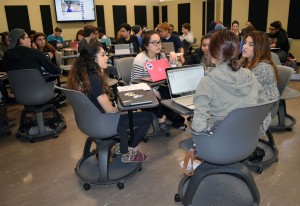
Photo: Klaus Trilck
Dr. Marilyn Easter, a professor of marketing and decision sciences, presents on her course redesign during a faculty and staff recognition luncheon hosted by eCampus on April 21.
During eCampus’ Faculty and Staff Recognition Luncheon on April 21, select presenters shared the way they have collaborated to enhance the curriculum in their course work in support of student success. Posters around the classroom where the luncheon was held showed some of the techniques used as part of the CSU Proven Course Redesign Grant and the university’s Quality Assurance Grant.
“We will highlight the work of staff and faculty, and hear and see what they’ve been working on,” said Jennifer Redd, director of eCampus, noting that theirwebsite lists many of the services they provide.
Dr. Marilyn Easter, a professor of marketing and decision sciences, and Prabha Chandrasekar, a mediated learning assistant, shared the ways they worked to redesign a Lucas College and Graduate School of Business introduction to marketing course with a goal of decreasing bottlenecks in the required course for students in their major. Bobbi Makani, a lecturer who also worked on the redesign, shared insights via a prerecorded video.
“To decrease bottlenecks, an online course is the solution,” Easter said. “We wanted to redesign it to make it accessible and easy to navigate.”
Using the campus learning management system Canvas, they created easy-to-digest modules each week for the students that included an overview of the content, a video introduction from Easter, step-by-step instructions, a description of learning outcomes, reading and assignments, and a “check your knowledge” section. Each week, the students also had a chance to engage live with Easter.
A student who provided a testimonial on video said that for her while working full time and taking courses toward an undergraduate degree, she sometimes struggled to get the courses she needed at times that worked for her schedule. Dr. Easter’s online course fulfilled her time needs while also providing engaging material.
Ravisha Mathur, an associate professor of child and adolescent development, and Debbie Weissman (via prerecorded video), a faculty member in the School of Information, discussed their experience as participants and more recently as team leaders with the Quality Assurance program. The program aims to evaluate the effectiveness of online courses and provides individualized mentoring to faculty to improve their online classes. Mathur, who is a peer reviewer this year, said the program helped her to improve student learning and engagement in the online environment.
The feedback she received from students showed her that they preferred some lecture information in PDFs that they could download to read at times when they were offline. She now also requires a “meet up” twice a semester for her online courses, in which students can personally engage and connect with her in person, online or by phone; she has seen an improvement in student achievement and motivation with these meet ups.
“It only has to be five to 10 minutes, but it usually ends up being 20 minutes,” she said. “Engagement goes up after that first meet up.”
Resa Kelly, a professor of chemistry and the science education program, and Yingjie Liu, an instructional designer with eCampus, discussed their work on incorporating augmented reality (AR) and virtual reality (VR) equipment into a post-baccalaureate science teaching credential program course.
“We looked at it as an exploration in a sense,” Kelly said, “To get them thinking about how they might try to teach with the technologies.”
The 2017-18 Quality Assurance application is available online, due June 18.

